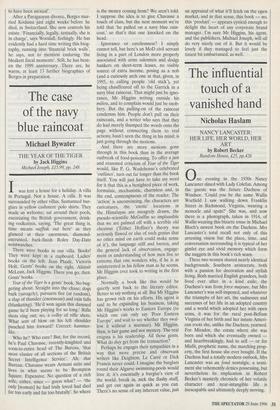The case of the navy blue raincoat
Michael Bywater
THE YEAR OF THE TIGER by Jack Higgins Michael Joseph, £15.99, pp. 248 Iwas lent a house for a holiday. A villa in Portugal. Not a house. A villa. It was surrounded by other villas. Suntanned bur- glars in yellow cashmere polo shirts. They made us welcome; sat around their pools, excoriating the British government, drink- ing vodkatinis, saying, 'The great thing is, time means nuffink out here' as they glanced at their enormous, diamond- encrusted, bark-finish Rolex Day-Date wristwatches.
There were books in our villa. Books! They were kept in a cupboard. Ladies' books on the left: Jean Plaidy, Victoria Holt. Gents' books on the right. Alistair McLean, Jack Higgins. There you go, then. Gents' books.
Year of the Tiger is a gents' book. No bug- gering about. Straight into the chase; dogs bark (savagely), pursuers fire (at random), a clap of thunder (enormous) and rain falls (blanketing). 'He'd won again this damned game he'd been playing for so long.' Rifle shots ring out; no, a volley of rifle shots. What sort of blow on his left shoulder punched him forward? Correct: hammer- like.
Who he? Who care? But, for the record, he's Paul Chavasse, recently-knighted and soon-to-retire head of The Bureau, 'that most elusive of all sections of the British Secret Intelligence Service'. Ah; that Bureau. Chavasse wears Armani suits and lives in what seems to be Brompton Square. Expensive. No question of a rich wife, either, since — guess what? — 'the only [woman] he had truly loved had died far too early and far too brutally'. So where is the money coming from? We aren't told. I suppose the idea is to give Chavasse a touch of class, but the next moment we're told that 'he pulled on a navy blue rain- coat,' so that's that one knocked on the head.
Ignorance or carelessness? I simply cannot tell, but here's an MoD civil servant living in a part of London more properly associated with arms salesmen and dodgy bankers on short-term leases, no visible source of extra income, posing as a nob (and a curiously arch one at that, given, in 1995, to calling people 'old stick'), yet being chauffeured off to the Garrick in a navy blue raincoat. That might just be igno- rance, Mr Higgins writing outside his milieu, and to complain would just be snob- bery. But the pulling-on of the raincoat condemns him. People don't pull on their raincoats, and a writer who says that they do had merely thumped the words onto the page without connecting them to real actions; hasn't seen the thing in his mind; is just going through the motions.
And there are more motions gone through in this book than in the average outbreak of food-poisoning. To offer a just and reasoned criticism of Year of the Tiger would, like P. G. Wodehouse's celebrated `outlines', turn out far longer than the book itself. You will just have to take my word for it that this is a benighted piece of work, formulaic, mechanistic, charmless and, in the end, contemptuous of the reader. The `action' is unconvincing, the characters are caricatures, the 'exotic' locations in the Himalayas are meagrely drawn, the pseudo-scientific McGuffin so implausible that we are palmed off with a terrible old chestnut (Either Hoffner's theory was seriously flawed or else of such genius that no other mind on earth could make sense of it'), the language stiff and barren, and the general lack of observation, engage- ment or understanding of how men live so extreme that one wonders why, if he is as uninterested in his fellow man as he seems, Mr Higgins ever took to writing in the first place. Normally a book like this would be quietly sent back to the literary editor. Better to say nothing at all. But Mr Higgins has grown rich on his efforts. His agent is said to be expanding his business, taking Mr Higgins's works to Eastern Europe (to which one can only say 'Poor Eastern Europe', and wait to see whether they swal- low it without a murmur). Mr Higgins, then, is fair game and not mystery. The real enigma is his readership. All those gents. What do they get from the transaction? Perhaps he engages their sympathies in a way that more precise and observant writers like Deighton, Le Carre or Dick Francis never could. I imagine the burglars round their Algarve swimming-pools would love it; it's essentially a burglar's view of the world: break in, nick the flashy stuff, and get out again as quick as you can. There's no sense of any inherent value, just an appraisal of what it'll fetch on the open market, and in that sense, this book — no, this 'product' — appears cynical enough to delight the heart of any corporate brand manager. I'm sure Mr Higgins, his agent, and the publishers, Michael Joseph, will all do very nicely out of it. But it would be lovely if they managed to feel just the tiniest bit embarrassed, as well.


























































 Previous page
Previous page